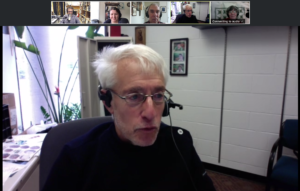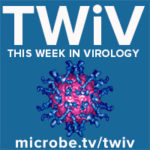Stanley Perlman joins TWiV to discuss immune responses to coronaviruses, including seasonal CoV, MERS, SARS, and SARS-CoV-2, including prospects for a vaccine.
Hosts: Vincent Racaniello, Rich Condit, Kathy Spindler, and Brianne Barker
Guest: Stanley Perlman
Click arrow to play
Download TWiV 602 (45 MB .mp3, 74 min)
Subscribe (free): iTunes, Google Podcasts, RSS, email
Become a patron of TWiV!
Links for this episode
- Perlman Laboratory 1:39
- An Iowa Caucus of Viruses (TWiV 538) 2:00
- Anti-SARS-CoV spike IgG and acute lung injury (JCI Insight) 28:07
- T cell responses to respiratory CoV (Immunol Res) 19:13
- Timestamps by Jolene. Thanks!
Intro music is by Ronald Jenkees.
Send your virology questions and comments to [email protected]



The download has the wrong episode number: “Download TWiV 600 (45 MB .mp3, 74 min)”.
Another terrific episode. Thank you so much for doing so many TWiVs each week. I’m getting spoiled.
I’m certainly a beginner even now in my understanding of viruses/immunology. What I’m wondering is this: if immunopathology is the driving force for the severe forms of the disease, how is it that the elderly, with their less robust immune systems, are getting it so severely? Is it that the immune systems of the elderly have fewer controls and so things can get out of hand easier? And Dr. Griffin had mentioned on an earlier TWiV that people with active malignancies also seem to get more severe cases of Covid-19, but their immune systems are also often suppressed due to their chemotherapy or just the natural course of their cancer. Obviously one needs a certain amount of immune system to be able to fight off disease, and I can understand that having zero immune function would not be good (as Dr. Perlman noted, we need some amount of neutrophils in the lungs, just not overwhelming amounts). Anyway, if, on a future TWiV or Immune you could touch on this, I’d sure like to know.
Thank you again for providing us with all these amazing, informative podcasts.
You may find this presentation on ACE2 helpful: “World leading geneticist and immunologist Josef Penninger on potential COVID-19 treatment,” presented in Austria March 13. Intriguing.
https://www.youtube.com/watch?v=jAW6VBWTiAA
Love your shows. I’m one of your newbies. Not only follow twiv but listened through your 2020 lectures + some later ones from 2019. Great work.
Many thx, chris
As a humble country doctor, I have to listen to your podcasts at least 6 times each before I can begin to absorb all you say.
Listening to Dr. Perlman’s description of the broad range of clinical features of coronaviruses from camels to human children, and hearing the frequent mention of ACE receptors prompted me to review the excellent explanation of the possible effects of ACE inhibitors and ARB’s in mediating response to COVID19 by the Institute for Evidence Based Medicine on their website.
I’m still struck, in my simple minded way, that COVID19 often begins with a “dry” (throat cough), which is a complaint which prompts the discontinuation of ACE inhbitors (and less commonly ARB’s) in clinical practice, (It’s said to happen in 10% of patients, but if you query the patient, and more importantly, the patient’s spouse, this annoying cough is likely present in closer to 60%.)
Why does messing with ACE or ACE receptors, so important to viral binding to members, result in throat cough, in patients not known to be infected with any virus?
There is a paper titled “Initial infectious dose dictates the innate, adaptive, and memory responses to influenza in the respiratory tract” that shows what happens to mice when infected with low vs high initial dose. It notes also that mice that received a high initial dose were much more likely to survive the second lethal dose than the mice whose first initial dose was low.
Maybe with CV19 children get a mild disease because their viral load never gets very high for some reason so when they infect others they give them a low dose…
I’d like to toss this out but I don’t know who to share it with. My wife, 63, and daughter, 18, were infected but had mild symptoms. I on the other hand am five weeks into trying to recover from bi-lateral pneumonia. A significant difference is I take an NSAID daily and neither of them did (I stopped after being diagnosed). Just wondered if this could be significant.
I have a question. I take an NSAID daily for back pain and was taking it when I contracted the Corona virus. My wife and daughter do not regularly take an NSAID. My COVID19 turned into bi-lateral pneumonia. They had very mild symptoms that passed in a week. Hearing that one should not take an NSAID after contracting the Corona virus, could this be significant? In my case, did the NSAID prevent a more robust inflammatory immune response to the virus resulting in increased infection of the lungs?
It was great learning experience .Thank you very much ASM and Prof.Dr.Perlman for giving us a wonderful scientific insight to Novel Corona Virus , COVID-19 , SARS 2 , Wuhan China Virus etc.
I’m an engineer interested in science and not a biomedical scientist. This was amazingly informative for a person like me. I have the following question:
If immune response may be the cause of significant illness in adults and few children become sick with covid-19, What is the difference between juvenile and adult response to infection?